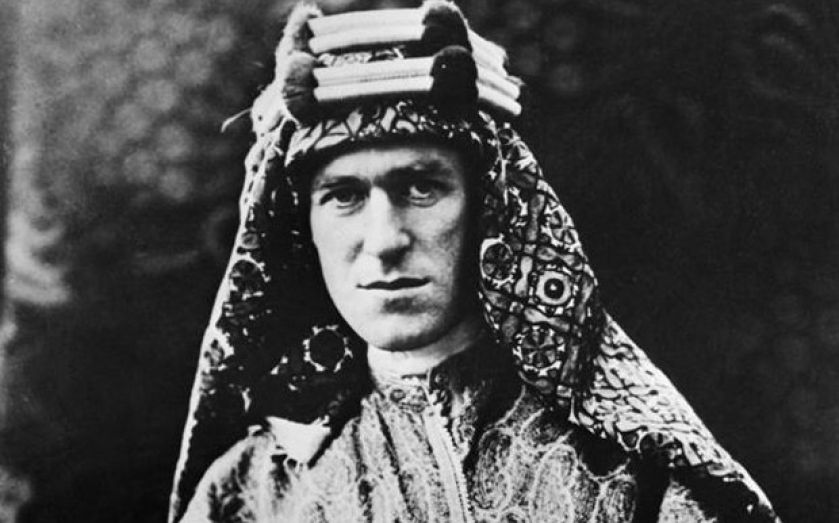Forget the neocons: How Lawrence of Arabia can help save Iraq from chaos

AS THE West casts about for an appropriate response to the perilous situation in Iraq, and with President Obama now saying that the US is potentially ready for “targeted military action” in the country, we would do well to ignore the tarnished faces of neoconservatism, calling for full intervention again at any cost. It’s time we consulted the original insurgent – TE Lawrence, Lawrence of Arabia.
In August 1917, after the capture of Aqaba in the First World War, the British High Command, fearing that the intrepid guerrilla Lawrence could be killed at any moment, tasked him with codifying what he had learned. It was feared that, if Lawrence were to die, his unique knowledge of dealing with Britain’s Arab allies would be lost forever. So in the midst of fighting the Ottoman Empire in Arabia and Syria as part of the Arab Revolt, Lawrence wearily began typing his Twenty-Seven Articles in the heat of the desert sun.
The articles are a brilliant mixture of political, military, and psychological thought, offering nothing less than a new way for westerners to work with the rest of the world. Soon ignored and a century ahead of their time, Lawrence realised that, without the political backing of the local Arab population, he could not win, and that with their support he could not lose.
Chastened by recent US history in the Middle East, the battered Obama administration is to be commended for groping toward a similar overall point of view in dealing with the latest Iraqi crisis. To help them along – as well as for the White House to see that what it faces is neither novel nor insurmountable – the situation calls out for a re-examination of a forgotten way of thinking, whose time has finally come.
First, Obama is quite right to demand (in contradiction to the tyrannical and hapless government of Iraqi Prime Minister Nouri Maliki) that political reform be agreed upon ahead of military help from the US. As General David Petraeus put it, America must not be seen to be merely the air force of the Shia militia. Given Maliki’s resolute refusal over the years to serve at the head of an inclusive government – where Sunnis and Kurds are afforded a real stake in what goes on – helping him survive militarily does not remotely begin to solve the political problems ISIS’s stunning victories have laid bare.
Like the great Prussian military theorist von Clausewitz, Lawrence saw clearly that military strategies are formulated to achieve political outcomes, and not the other way around. The current Sunni revolt in Iraq (of which the rise of ISIS is merely a major part) is more about political exclusion than military matters. Until a radical plan for the immediate political inclusion of Kurds and Sunnis in a unity government is publicly accepted by the current Iraqi government (or any successor), there should be no thought of Washington complying with Baghdad’s desperate request for the US to bomb the Sunni rebels, as such a course of action would accomplish absolutely nothing.
Second, Lawrence worked with Arab political realities, not ignoring them. The unit of politics in the world of Lawrence’s Bedu allies was tribal and local. Rather than glossing over this inconvenient fact, Lawrence constructed enduring political links on the basis of the genuine organic cultural and political characteristics of his allies.
In the present case of Iraq, the unit of politics is religious and ethnic, not that of a homogenous national people – the three major political units are the Shia (roughly 60 per cent of the population), the restive Sunnis (20 per cent), and the de facto independent Kurds (20 per cent). As the Kurdish leadership has made clear, the old, unnatural, centralised Iraq has been destroyed by the ISIS invasion. Today’s political reality calls for adapting political structures to fit the world as it is.
As I argued over a decade ago, Iraq – with its deep-seated ethnic and religious divisions – needs a more confederal approach, in tune with its three major political building blocks. This outcome suits the facts on the ground far better than a doomed effort to reimpose overly centralised control, a condition sure to continue to alienate these core groups, thus ensuring endless instability.
Lastly, to save both his overall foreign policy and Iraq itself, Obama must heed the words of a weary Lawrence to his friend Gilbert Clayton in far-away 1918. “It is impossible for a foreigner to run another people of their own free will indefinitely, and my innings has been a fairly long one.” Obama must have the courage to walk away from Iraq, if Lawrence’s stringent conditions for intervention are not met. He must not endanger his pivot to Asia, only to be mired propping up a Maliki regime unwilling to change its basic sectarian nature. As Lawrence had it, “It is their war, and you are to help them, not win it for them.”
Dr John C Hulsman is senior columnist at City A.M., and president and co-founder of John C Hulsman Enterprises (www.john-hulsman.com), a global political risk consultancy. He is a life member of the Council on Foreign Relations, and author of Ethical Realism, The Godfather Doctrine, and most recently Lawrence of Arabia, To Begin the World Over Again.